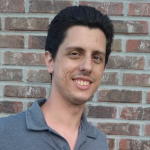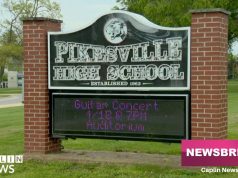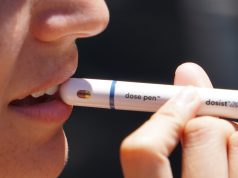We live in the age of information; one could argue that competing narratives mean that we live in the age of information warfare. It is the responsibility of the media to air authentic information, especially concerning medical facts. When people are misinformed, people suffer and die as a result. Countless stories and anecdotes remind us of the very real consequences of medical non-compliance.
“The main reason I got the vaccine was to protect my family since my parents are very old, I didn’t want them to get sick,” says Caroline Alonso, a graduate of FIU. “It’s crazy because my mom and my dad said not to get it even though I was doing it to protect them. Even fourteen cousins of my uncle all passed away because they didn’t get the vaccine.”
Unfortunately, we also live in the age of entitlement, where everyone feels entitled to their opinion, even misinformed opinions, which can wreak havoc on public perception, especially regarding crucial decision-making, leading people to defiantly resist vaccination. Reasons for objecting can range from mistrust of science, religious exemptions, freedom of conscience, and previous contraction of the virus.
“Vaccine hesitancy,” writes the National Library of Medicine, “is a relatively new term used in research over the past few years to describe anyone who is doubtful about vaccinations or who chooses to delay or refuse immunizations even when they are readily available.”
Social media giants like Facebook, Instagram, YouTube, Twitter, and TikTok claim to use a clever combination of artificial intelligence and human reviewers to fact-check and verify the validity of content published on their platforms. Despite their vaunted efforts, people continue to absorb fallacious messages that slip through as factual.
The Sun Sentinel reports, (2023) “The misinformation unnecessarily costs lives. The CDC has said that. The World Health Organization has said that. And the data confirm that,” Stephen Neely said, [an associate professor at USF’s School of Public Affairs.]. “It’s disheartening, but it’s the reality that we’re facing right now. … Overall, people perceive vaccines to be generally safe and efficacious. But even among those who do, there’s still pretty widespread belief in some things that are not true.”
While accuracy and precision of reporting are principal priorities, it doesn’t relinquish our responsibility to preserve and defend certain fundamental rights. In the pursuit of authentic information, unfortunately, peaceful dissidents and critics were silenced.
Human Rights Watch reports (2021), “Governments should counter Covid-19 by encouraging people to mask up, not shut up,” said Gerry Simpson, associate crisis and conflict director at Human Rights Watch. “Beating, detaining, prosecuting, and censoring peaceful critics violates many fundamental rights, including free speech, while doing nothing to stop the pandemic.”
While a healthy dose of scientific skepticism is essential to evaluating information, many of the objections raised by dissidents and critics are due to delusion and superstition, which comes from the spreading of misinformation.
ABC News reports (2022), for example, that Florida’s surgeon general published an analysis warning that COVID-19 vaccines increase the risk of “cardiac-related deaths in young men.” Vaccine experts are calling the study “poorly designed and dangerously misleading.” ABC News also reports (2023), “as of Monday, 43 of Florida’s 67 counties reported moderate levels of weekly new hospital admissions for COVID-19 — a higher proportion than any other state in the U.S., data from the CDC shows.”
Local communities are also affected by the spread of mythical rumors, such as the vaccine rendering people infertile, causing autism, and inducing sudden death. All of these claims have been debunked by fact-checkers and the medical community with contrary evidence.
The New York Times reports (2021), “It’s a myth, it’s inaccurate — there’s no evidence to support their perception,” said Saad Omer, a vaccine expert at Yale University. Expert agencies that oversee the clearance of vaccines for use in people, he added, “have a rigorous process” to weed out products that might cause such disastrous effects. “And when things happen, action is taken,” Dr. Omer said.
Something as simple as COVID-19 testing, which can be rendered useless with one whisper of doubt such as “Those tests don’t work,” or “COVID-19 isn’t real,” has serious ramifications for the vulnerable public who rely upon collective awareness of infection to mitigate the spread of the virus.
The National Library of Medicine (2020) writes, “Diagnostic tests for the coronavirus infection 2019 (COVID-19) are critical for prompt diagnosis, treatment and isolation to break the cycle of transmission.”
Promoting health literacy and critical thinking is often cited as a solution to the credulity and naivety of the common people. Instead of forcing people to make certain decisions, they are empowered to make them themselves.
The Office of Minority Health (OMH) at the U.S. Department of Health and Human Services (HHS) reports (2022), “Studies estimate that only 14% of the U.S. population has proficient health literacy. This means that many of the people we care about struggle to find, understand, and use information and services required to make informed, health-related decisions and actions for themselves and others. Low health literacy levels left many people susceptible to dangerous COVID-19 misinformation and disinformation during the pandemic.”
It’s clear from the data that medical misinformation affects communities of all sizes from all around the world. Whether it’s mRNA vaccines, n95 masks, social-distancing protocols, or government-issued lockdowns, understanding the need for these interventions and behaving in compliance with them for the sake of ourselves and others is one way to combat misinformation. Lead by example, negate the rumors, educate yourself and others on medical facts, and most of all, when you see misinformation, look the other way.

































